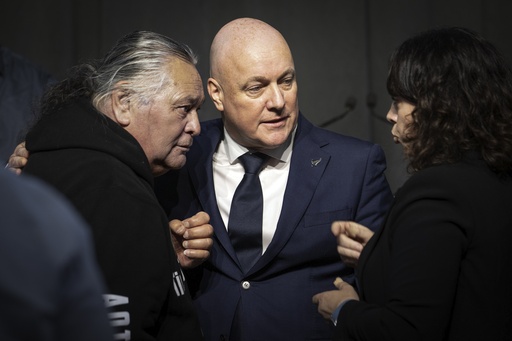
In Wellington, New Zealand, hundreds of individuals who faced abuse within state, foster, and faith-based care systems gathered at the Parliament on Tuesday, each representative of countless others who endured similar traumas. They arrived to hear the government extend a formal apology for the “unimaginable” suffering they endured during their childhood and as vulnerable adults, following the release of a comprehensive inquiry report in July that detailed the extent of the abuse.
Prime Minister Christopher Luxon addressed the assembly, expressing his deep regret, stating, “You deserved so much better and I am deeply sorry that New Zealand did not do better by you.” The event saw attendees wearing specially designed T-shirts, with some requiring canes or wheelchairs due to the lasting impacts of their traumatic experiences in hospitals, institutions, and care homes after being removed from their families. Although the public gallery has limited seating for fewer than 200 people, a ballot allowed 500 survivors to participate in the proceedings.
Many attendees left feeling disappointed, particularly as specific details regarding potential financial compensation were not disclosed during the session. However, Luxon assured those present that a redress system will be up and running by next year.
Survivors shared their thoughts on the day’s proceedings. Tu Chapman, a survivor and adviser for the inquiry, remarked on the frustrating experience, stating, “Right now I feel alone and in utter despair at the way in which this government has undertaken the task of acknowledging all survivors.” Chapman expressed frustration over the perceived inadequacy of the apology, indicating that their voices and experiences have been systematically invalidated. “I think it was a hollow and limited apology,” she continued. “Stop tinkering around and just get on with it.”
Another survivor, Helen Beauchamp, revealed the long history of abuse in her family, having bounced between 20 foster homes by the age of four. She lamented how the bureaucratic system remains slow, complicating any hope for closure: “Surviving has been a roller coaster and we still don’t have a picture of the outcome,” she shared. Beauchamp, one of the selected few to witness the proceedings, felt that the moment needed to resonate more deeply with future generations.
Jazmine Te Hiwi, who endured life in two camps for troubled youth, emphasized the emotional challenge of acknowledgment, sharing, “How do you accept that after being denied for 40 years of your life?” She also articulated the disconnect felt by survivors—observing that many in power lack an understanding of the issues faced by those who have suffered: “There’s a reason why some of our youth are doing crimes. We were just innocent kids that were taken advantage of.” Te Hiwi called for a more comprehensive understanding of the struggles facing today’s youth, urging that many are simply seeking love and attention, not ostracism.
This gathering at Parliament marks a continued journey toward recognition and healing for survivors who have fought for decades to be heard and acknowledged.
